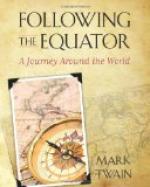Sometimes one saw a woman carrying on her head a laden and top-heavy basket the shape of an inverted pyramid-its top the size of a soup-plate, its base the diameter of a teacup. It required nice balancing—and got it.
No bright colors; yet there were a good many Hindoos.
The Second Class Passenger came over as usual at “lights out” (11) and we lounged along the spacious vague solitudes of the deck and smoked the peaceful pipe and talked. He told me an incident in Mr. Barnum’s life which was evidently characteristic of that great showman in several ways:
This was Barnum’s purchase of Shakespeare’s birthplace, a quarter of a century ago. The Second Class Passenger was in Jamrach’s employ at the time and knew Barnum well. He said the thing began in this way. One morning Barnum and Jamrach were in Jamrach’s little private snuggery back of the wilderness of caged monkeys and snakes and other commonplaces of Jamrach’s stock in trade, refreshing themselves after an arduous stroke of business, Jamrach with something orthodox, Barnum with something heterodox—for Barnum was a teetotaler. The stroke of business was in the elephant line. Jamrach had contracted to deliver to Barnum in New York 18 elephants for $360,000 in time for the next season’s opening. Then it occurred to Mr. Barnum that he needed a “card” He suggested Jumbo. Jamrach said he would have to think of something else—Jumbo couldn’t be had; the Zoo wouldn’t part with that elephant. Barnum said he was willing to pay a fortune for Jumbo if he could get him. Jamrach said it was no use to think about it; that Jumbo was as popular as the Prince of Wales and the Zoo wouldn’t dare to sell him; all England would be outraged at the idea; Jumbo was an English institution; he was part of the national glory; one might as well think of buying the Nelson monument. Barnum spoke up with vivacity and said:
“It’s a first-rate idea. I’ll buy the Monument.”
Jamrach was speechless for a second. Then he said, like one ashamed “You caught me. I was napping. For a moment I thought you were in earnest.”
Barnum said pleasantly—
“I was in earnest. I know they won’t sell it, but no matter, I will not throw away a good idea for all that. All I want is a big advertisement. I will keep the thing in mind, and if nothing better turns up I will offer to buy it. That will answer every purpose. It will furnish me a couple of columns of gratis advertising in every English and American paper for a couple of months, and give my show the biggest boom a show ever had in this world.”
Jamrach started to deliver a burst of admiration, but was interrupted by Barnum, who said:
“Here is a state of things! England ought to blush.”
His eye had fallen upon something in the newspaper. He read it through to himself, then read it aloud. It said that the house that Shakespeare was born in at Stratford-on-Avon was falling gradually to ruin through neglect; that the room where the poet first saw the light was now serving as a butcher’s shop; that all appeals to England to contribute money (the requisite sum stated) to buy and repair the house and place it in the care of salaried and trustworthy keepers had fallen resultless. Then Barnum said:




